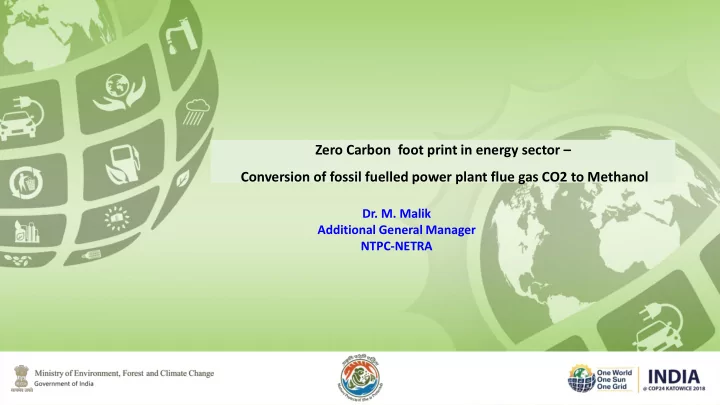

Zero Carbon foot print in energy sector – Conversion of fossil fuelled power plant flue gas CO2 to Methanol Dr. M. Malik Additional General Manager NTPC-NETRA
Global Climate Change-A great threat to humanity
India’s initiatives towards Global Climate Change India’s Nationally Determined Contributions Towards Climate Justice Oct 2016-India ratified Paris Climate agreement Supports global initiative to reduce temperature by 1.5 0 to 2 0 C Voluntary reduction of emission intensity to 33-35 % by 2030 w.r.t 2005 Plans to have 40% of total installed electric power from non-fossil
NTPC India’s Powerful Maharatna • 52000+ MW capacity in Operation • 20000+ MW under Construction • 20- Coal, 7-Gas,1-Hydro, 1-small hydro, 1- Wind , 11- solar, 9-JV • 10 coal mine blocks awarded by GOI • 22,000+ committed workforce
NTPC’s share in All India Generation and Capacity NTPC Share in India’s installed Capacity NTPC Share in India’s Generation (31.3.2017) (GW) (FY 16-17) (BU) NTPC NTPC 15.5 % (24%) Others 84.5% (76%) NTPC Group – 50.5 GW NTPC Group – 277 BU Rest of India – 276.4 GW Rest of India – 877 BU
NTPC Energy Technology Research Alliance Amongst select few world utilities • NETRA is the R&D wing of NTPC. to have its own R&D Centre • Unique R&D facility which caters the technical service (EON, RWE, EDF) needs of power sector on national and international level and involved in the applied research in identifying and • DSIR Accreditation implementing the cutting edge technologies. • NABL Accreditation National collaboration with NETRA’s.... Focus Areas International Collaborations academic Institutions, R&D Institutions and Industries GERMANY USA INDIA AUSTRALIA Climate New & Efficiency & Advanced Change & Renewable Availability Scientific Environment Energy Improvement Services Japan
Major sources of CO 2 Emissions Burning of fossil fuels Power Plants -25% Transportation -14% Agri, forestry- 24% Industrial – 21% Source: IPCC (2014) based on global emissions from 2010.
Co Conversio ion of f fossil ssil fu fuelle led power plant flu flue gas as CO 2 to Meth thanol v
Why Meth thanol is is preferred? • Methanol is used largely as feedstock for many chemicals, Formaldehyde, acetic acid, polymers, paints, adhesives, construction materials. • Methanol could become more readily available (Methanol economy) as an alternate fuel • Less CO, NOx, SOx, and VOC’s. • Onboard Methanol Reformer emissions are less. • Readily degraded through photo oxidation and biodegradation. • Degrades in almost all environments. • No evidence of bioaccumulation.
Methanol as a Alternative Fuel - Advantages Lower Emissions Lower Price per Calorie Safer Liquid Fuel Energy Efficiency, High Octane A solution for internal combustion engines Utilize existing infrastructure Creation of local employment opportunities
Processes involved in CO2 to Methanol Production CO 2 extraction from flue gas H 2 Manufacturing CO 2 to methanol reactor
MefCO 2 – Methanol Fuel From CO 2
Sali alient features of of MefCO 2 • Hydrogen production: Demonstration of flexible operation of water electrolysers can be used to decrease energy costs of hydrogen production. • Optimised power plant operation when coupled with flexible hydrogen production for methanol production. • CCU can help power plant to maintain its competiveness while reducing their emissions. • Growth of cost competitive non- manageable renewable energy generation will spur a new set of business opportunities. • Methanol produced in MefCO2 is considered as an advanced fuel and its renewable energy content can be double counted towards the Renewable energy content in transport. • Moreover, direct blending of methanol with gasoline can reduce the imports of gasoline.
What t are th the key exp xpected sustain inabilit ity im impacts ts of of MefC fCO 2 ? Indicator Reduction of CO2 emissions of power plant Global Warming Potential (CO2 emission reduction) of CCU w/o CCS - methanol as renewable fuel Reduction in Fossil energy intensity - Fossil fuel displacement when substituting fossil gasoline
Development, Design and Setup of Integrated Flue Gas Carbon Capture and Methanol (FG-CC-MeOH) Pilot Plant in NTPC Power Station Carbon foot print reduction through utilization pathway for fossil fired power plant Power Plant Thermal plant Methanol Electrolysis Technology: Benefits: • India‘s first power plant with carbon capture unit. Energy efficient CO 2 separation from Flue Gas of Fossil fired power plant World’s first methanol production plant based on • Conversion of captured CO 2 to Methanol by catalytic CO 2 captured from flue gas of fossil fired plant. hydrogenation Potential revenue stream for power plants Making fossil fired power plant environment friendly & thereby sustainable
Summary of the presentation • Global Climate Change - A great threat to humanity • India’s initiatives towards Global Climate Change - reduction of emission intensity to 33- 35 % by 2030 • NTPC’s share in All India Generation and Capacity- NTPC is India’s leading power major having more than 52GW energy generation • NTPC Energy Technology Research Alliance- It is a unique R&D facility which caters the technical service needs of power sector • Major sources of CO 2 Emissions- ¼ th of CO 2 emissions are released by power plants • Methanol is preferred as Methanol is used largely as feedstock for many chemicals • Methanol as a Fuel Alternative because of its Advantages • In power plant scenario, Methanol can be produced by the catalytic hydrogenation of CO 2 captured from flue gas • CCU can help power plant to maintain its competiveness while reducing their emissions • MefCO 2 results could contribute to the reduction of the dependency on methanol imports
Recommend
More recommend